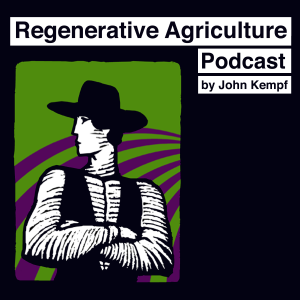
Regenerative Agriculture Podcast
Science:Earth Sciences

Dr. Dwayne Beck is well known for being one of the pioneers of no-till agriculture in central South Dakota and across the High Plains. For more than three decades, Dr. Beck has been creating comprehensive systems for both irrigated and dryland crop production throughout the region, educating growers on the power of crop rotation, diversity, and other regenerative practices. He currently serves as the Research Manager at the Dakota Lakes Research Farm, a non-profit made up of farmers committed to sustainable land practices.
On today’s episode, John and Dwayne discuss:
Dwayne’s background and his earlier work assisting local growers with their irrigation systems The continuing decline of the Ogallala Aquifer and how water infiltration can be improved by implementing no-till agricultural practices. Addressing the often-overlooked aspects of irrigation, such as percolation and water delivery, and how it affects soil health. Dwayne’s observations on lake bottom soils, the power of macropores, and the prevalence of summer fallowing in the High Plains. Utilizing de-percolation strategies to maintain proper nutrient levels in your soil. Using competition, sanitation, and rotation to control weeds, diseases and insects. Dwayne’s historical research on nutrient cycling and fertilizer placement. Dwayne offers up a broader historical perspective on how agriculture, human nature, and mother nature work together. A discussion on why moving to no-till options for all crops including potatoes, carrots and sugar beets are engineering and genetics problems. The shared vision, but much different methods, between regenerative agriculture vs. organic agriculture.More Episodes
Create your
podcast in
minutes
- Full-featured podcast site
- Unlimited storage and bandwidth
- Comprehensive podcast stats
- Distribute to Apple Podcasts, Spotify, and more
- Make money with your podcast
It is Free
- Privacy Policy
- Cookie Policy
- Terms of Use
- Consent Preferences
- Copyright © 2015-2024 Podbean.com






